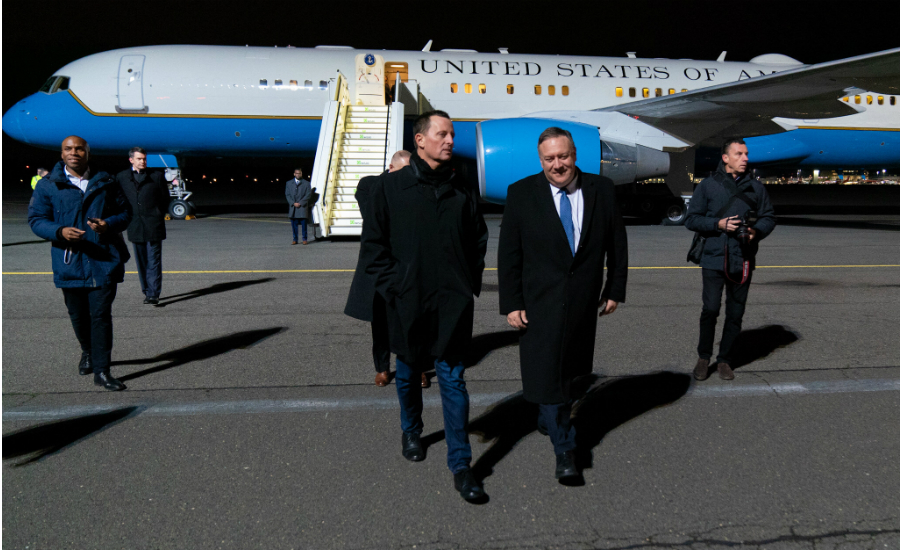Does Trump Care About the Director of National Intelligence?
The president's choice of acting director may be sending a message to the intelligence community.

Editor’s Note: The appointment of Richard Grenell to be the acting director of national intelligence is yet another sign that President Trump prefers loyalists over seasoned professionals for important national security positions. Josh Rovner of American University details several ways to understand the Grenell appointment and how it is likely to further weaken coordination of the intelligence community.
Daniel Byman
***
President Trump announced on Feb. 19 that Richard Grenell, currently the U.S. ambassador to Germany, is taking over as acting director of national intelligence. Critics see the decision as clear evidence that Trump is politicizing the intelligence community. Grenell has no background in intelligence but is a longtime political ally of the president. A combative partisan, Grenell is well known for feuding with opponents on social media and in person. To critics, the decision to put a political operative in charge of the nation’s intelligence community is a signal that the president will bend its analysis to suit his needs.
The term of art for this process is “manipulation-by-appointment.” Rather than trying to force intelligence analysts to change their views in ways that are politically convenient, this kind of politicization works by making sure their bosses are politically pliable. Manipulation-by-appointment reduces the risk of a public scandal because politicians are less likely to come into conflict with intelligence chiefs. There is no need to strong-arm intelligence agencies to fall in line with policy if the chiefs are already on board.
At first glance, this seems like a textbook example. The president has put a staunch supporter and aggressive spokesman at the helm of the intelligence community. Trump may seek estimates that are consistent with his worldview and seek to use them to support his policies. He may be especially interested in stifling intelligence on Russian meddling if he fears that Democrats will use it against him in the election. Promoting Grenell could be a sign that he is unwilling to brook any dissent from intelligence and is fixing the facts in advance.
But there are other ways of understanding the appointment.
It may be a sign, for example, that Trump has very little interest in the Office of the Director of National Intelligence (ODNI) as a corporate entity. The president seems to be interested in tactical intelligence, like the kind used to locate terrorists and other individuals singled out for targeted killing. Trump praised intelligence effusively after strikes on Islamic State leader Abu Bakr al-Baghdadi and Iranian General Qassem Soleimani. He has been less concerned with the kind of strategic estimates that are coordinated through the ODNI. Trump reportedly does not read intelligence assessments, does not ask probing questions of his intelligence advisors, and does not schedule intelligence briefings nearly as often as his predecessors.
Grenell’s appointment may be another signal of Trump’s disinterest. In one sense, Trump is treating the post of director of national intelligence as akin to an ambassadorship that can be safely doled out to a political ally. (Notably, Grenell will not step down from his ambassadorial role while serving in his new capacity.) If this is the case, officials at the ODNI may view the move as a sign that the president views them as irrelevant, not that he is trying to manipulate their work. Such suspicions probably grew when Trump floated Rep. Doug Collins (R-GA) as a possible permanent director. Collins is currently running against another Republican for Georgia’s open Senate seat, and the White House may hope it can solve an intra-party dispute by enticing him to take the DNI position instead. Dangling the job in front of Collins effectively transforms the nation’s highest intelligence office into in instrument to resolve GOP infighting. This does not say much for Trump’s regard for intelligence.
One other possibility is that Grenell’s appointment is related to the ongoing U.S. campaign to convince its European allies to reject overtures from the Chinese firm Huawei to build and maintain infrastructure for the next generation of wireless technology (5G). Just a few days earlier, Grenell tweeted that future intelligence-sharing agreements with the United States would be at risk if allies continued to work with Huawei. Europeans may take Grenell’s threats about intelligence sharing more seriously now that he is leading the U.S. intelligence community, at least temporarily. This might be a side effect of the Grenell appointment, however, and not a reason for it.
The decision may have organizational implications that go beyond politics and policy. Many intelligence professionals will surely be worried about Grenell’s appointment, no matter Trump’s motivation. If the comments of retired officials are any indication, career officers will probably rankle at the choice of a political operative with no intelligence experience. Others, however, may quietly welcome anything that undercuts the power of the director of national intelligence. The original legislation creating that role constrained the authority of the person who filled it, and the power of the director has always depended on his relationship with the president. The fact that the new acting director of national intelligence will apparently split time between Washington and Berlin suggests that neither the president nor his new appointee thinks much of the office, and the various agencies that compose the intelligence community may see this as an opportunity to increase their influence.
Inter-agency competition has always existed alongside efforts to improve intelligence community coordination. What might happen if the diminished role of the DNI tilts the balance towards competition? One possibility is that coordinated products like National Intelligence Estimates may become less important than assessments reflecting the views of specific agencies. While this is not necessarily a bad outcome—some competition may encourage agencies to sharpen their views—it may also make it easier for policymakers to cherry-pick among estimates that reinforce their preexisting views. In addition, the process of coordinating estimates is sometimes useful because it forces different agencies to wrestle with different perspectives on the same question. The habit of constructive debate will atrophy if no one has reason to force the debate.
It is unclear how all these issues will play out in 2020. Grenell has already declared that his position is temporary and that someone else will be nominated for the full-time job. The longer Trump waits for that someone, of course, the closer we get to the November election. The choice of who will fill the role long term and face Senate confirmation may have enormous implications, especially if Senators are forced to consider a nakedly partisan appointee with few qualifications. Doing so will not only risk further damage to intelligence-policy relations, but also undermine congressional oversight. Members of the Senate intelligence committee have worked hard to preserve a reputation for sobriety and bipartisanship. They will find it much harder to do so if they split over the confirmation of a partisan DNI.





